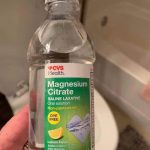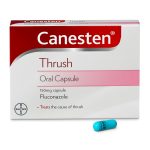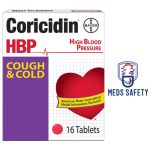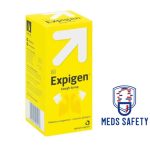Mucopect: Uses, Benefits, Dosage, Side Effects, FAQs
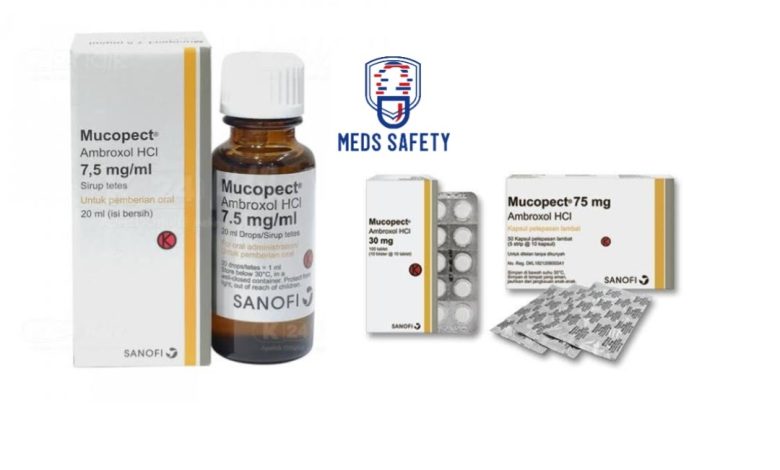
What is the drug Mucopect used for?
Mucopect is a brand name for a medication containing the active ingredient ambroxol. Ambroxol is commonly used as an expectorant, which helps to thin and loosen mucus in the respiratory tract. By promoting the clearance of mucus, it can help alleviate symptoms associated with respiratory conditions such as cough, bronchitis, and other conditions involving excessive mucus production such as emphysema with bronchitis pneumoconiosis, chronic inflammatory pulmonary conditions, tracheobronchitis (respiratory tract inflammation), bronchiectasis, bronchitis with bronchospasm asthma.
Some potential benefits of using Mucopect may include:
1. Mucus Clearance: Mucopect helps to thin and loosen mucus in the respiratory tract, making it easier to cough up and expel. This can be particularly beneficial for individuals with conditions such as bronchitis, chronic obstructive pulmonary disease (COPD), and other respiratory infections.
2. Relief from Cough: By promoting mucus clearance, Mucopect can help reduce coughing caused by the accumulation of mucus in the airways. It may provide symptomatic relief for both productive coughs (coughs that produce mucus) and non-productive coughs (coughs without mucus).
3. Ease of Breathing: By reducing mucus buildup and improving airway clearance, ambroxol can help improve breathing difficulties associated with conditions like asthma, bronchitis, and other respiratory disorders.
4. Enhanced Effectiveness of Antibiotics: Mucopect has been found to enhance the effectiveness of certain antibiotics, particularly in treating respiratory tract infections. It can improve the penetration of antibiotics into the respiratory tract, thereby aiding in the treatment of infections.
It is important to note that the specific benefits and effectiveness of Mucopect can vary depending on individual circumstances and the underlying respiratory condition. It is always advisable to consult with a healthcare professional for personalized advice and guidance regarding its usage and potential benefits in your specific case.
Mucopect Dosage
Mucopect is available in syrup, tablets, and drops. The recommended dosage of Mucopect is as follows:
- Adults: The recommended dose of Mucopect for an adult is 30 mg three times a day. A maximum of 120 mg of Mucopect can be taken daily in divided doses. In patients with renal impairment, dose reduction may be necessary.
- Children up to 2 years: half a teaspoonful Mucopect syrup twice daily
- Children 2 – 5 years: half a teaspoonful Mucopect syrup 3 times daily
- Children over 5 years: One teaspoonful Mucopect syrup 2-3 times daily.
It is essential to consult with a healthcare professional, as they will determine the appropriate dosage based on individual factors and may adjust it as necessary. They will consider factors such as the patient’s age, weight, medical history, and the specific condition being treated.
Always follow the instructions provided by the healthcare professional or the product’s packaging for the most accurate and up-to-date information regarding Mucopect dosage.
Mucopect side effects
Mucopect is generally considered safe and well-tolerated when used as directed. However, like any medication, it may have potential side effects. Common side effects of Mucopect can include:
1. Gastrointestinal Issues: These may include mild stomach upset, nausea, vomiting, diarrhea, or abdominal pain.
2. Allergic Reactions: Although rare, some individuals may experience allergic reactions to ambroxol. Symptoms may include skin rash, itching, swelling, dizziness, or difficulty breathing. If any signs of an allergic reaction occur, immediate medical attention should be sought.
3. Headache: Some individuals may experience headaches while taking Mucopect.
4. Taste Alterations: Mucopect may cause changes in taste perception, such as a metallic or bitter taste in the mouth.
5. Other less common side effects: These may include dizziness, drowsiness, dry mouth, or skin reactions like hives or rash.
It’s important to note that this is not an exhaustive list of side effects, and other reactions may occur. If you experience any persistent or severe side effects while taking Mucopect, it is advised to discontinue use and consult a healthcare professional.
Additionally, it’s essential to consult a healthcare professional before using Mucopect, especially if you have any underlying medical conditions, taking other medications, or are pregnant or breastfeeding, as they can provide personalized advice and assess any potential risks or interactions specific to your situation.
Interactions
Mucopect may interact with other medications or substances, potentially affecting their effectiveness or increasing the risk of side effects. It is important to inform your healthcare professional about all the medications, supplements, or herbal products you are currently taking before starting Mucopect. Here are a few examples of potential interactions:
1. Cough Suppressants: Taking Mucopect together with cough suppressants may counteract the effects of each other. It is generally recommended to avoid using both medications simultaneously unless specifically instructed by a healthcare professional.
2. Antitussives: Mucopect can increase the effectiveness of certain antitussive medications, which are used to relieve coughing. Combining ambroxol with antitussives may enhance the suppression of cough reflex and provide better relief. However, it is important to follow the guidance of a healthcare professional when using them together.
3. Antibiotics: Mucopect has been shown to enhance the penetration of certain antibiotics into the respiratory tract, potentially improving their effectiveness. This interaction is particularly relevant in the context of treating respiratory tract infections. It is advisable to consult with a healthcare professional for guidance on the appropriate use of ambroxol with antibiotics.
4. Drug Metabolism: Mucopect may have an impact on the metabolism of certain medications, potentially altering their blood levels. It is important to inform your healthcare professional about all the medications you are taking, including prescription and over-the-counter drugs, to assess any potential interactions.
These are just a few examples, and there may be other interactions specific to your medical history and the medications you are using. It is crucial to consult with a healthcare professional or pharmacist to ensure the safe and effective use of Mucopect and to receive personalized advice regarding potential interactions.
Frequently Asked Questions about Mucopect
Which is better, Mucopect or Bromhexine-based medications?
Both Mucopect and Bromhexine-based medications are mucolytic agents. Both drugs are used orally to clear the mucus away from the lungs or airways. Bromhexine is converted into Ambroxol (main metabolite) in the body. So, the risk of an anaphylactic reaction is the same for both drugs. Moreover, you can consult our team for expert opinions.
Is Mucopect an antibiotic?
No, Mucopect is not an antibiotic. Ambroxol the active ingredient in Mucopect belongs to the mucolytic class of drugs used to treat acute and chronic pulmonary diseases associated with excessive mucus formation. It loosens the thickened mucus in the airways passages and helps it easily cough out from the airways.
Does Mucopect make you sleepy?
No, Mucopect does not make you feel sleepy. However, its use is associated with gastrointestinal side effects, abdominal pain, stomach upset, skin rash, etc. Further, for more information related to the side effects of Mucopect, you can reach out to our medical consultants for expert opinions.
Is Mucopect good for dry cough?
Mucopect is more effective in productive cough treatment associated with the formation of sticky and thick mucus in the airway passages and is difficult to clear. Mucopect reduces its thickness and makes its removal easier from the airways passage.
For how long should one take Mucopect?
For adults, Mucopect is advised to be taken in a dose of 30 mg three times a day. It should not be used for more than 7 days. If there is no improvement after continuous use of 7 days or you experience any allergic reaction to Mucopect, you should consult your doctor.
Is Mucopect safe for babies?
Yes, Mucopect can be given to babies on the recommendation of a doctor. However, the recommended dose for babies is – Infants below 6 months: 0.5 mL every 12 hours For 7 to 12 months: 1 mL every 12 hours For 1 to 2 years: 1.25 mL every 12 hours For more information on the safe use of Mucopect in babies, you can consult our medical experts.
Is Mucopect safe for pregnant women?
No, Mucopect should not be given to pregnant women; especially, in the first trimester because it causes fetal lung maturation. Additionally, it is not advisable to use it in breastfeeding mothers as it passes into breast milk. You should consult your doctor if you are pregnant or breastfeeding. Moreover, you can contact our team of medical experts.
Is Mucopect alcohol?
No, Mucopect is not an alcohol. Instead, it belongs to a different class of drug, i.e., mucolytic agent (break-thick mucus), and is helpful in the removal of the loosened cough that makes breathing easier for the patients. It is used to treat various respiratory disorders associated with excessive cough formation.
Is Mucopect good for asthma?
Yes, Mucopect is very effective in bronchial asthma. The symptoms associated with bronchial asthma are cough, phlegm (thick mucus), and wheezing. Mucopect acts as a dissolving agent for phlegm and can facilitate the secretion of loosened mucus adhered in the respiratory tract and helps improve the symptoms

